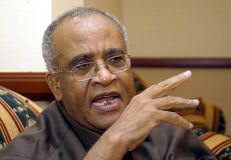AU proposes draft Darfur peace deal as deadline nears
April 25, 2006 (ABUJA) — The African Union proposed a peace deal for Sudan’s Darfur region on Tuesday that would require the government to disarm its proxy Janjaweed militias as a key step towards ending the three-year-old conflict.
 The draft agreement is the result of close to two years of arduous negotiations in the Nigerian capital between the Sudanese government and two Darfur rebel movements, mediated by the African Union (AU) which has set an April 30 deadline.
The draft agreement is the result of close to two years of arduous negotiations in the Nigerian capital between the Sudanese government and two Darfur rebel movements, mediated by the African Union (AU) which has set an April 30 deadline.
“This agreement does not give you everything you wanted, but it is an agreement you can live with,” AU chief mediator Salim Ahmed Salim told government and rebel delegates at the presentation of the 85-page draft.
“You must bury your mutual suspicion … This is decision time. No more procrastination,” he said.
The AU said the proposed deal, which covers the three key areas of security, power-sharing and wealth-sharing, will test the sincerity of the Sudanese parties.
“The agreement will not satisfy those who want 100 percent of their demands to be met or who are interested in power for themselves,” Sam Ibok, head of the AU mediation team, told Reuters just before the formal presentation.
“But if they are interested in a solution for the people of Darfur, in the guarantee of security, the return of refugees, economic development, ending the marginalisation of Darfur, then they will find a lot in this agreement,” he said.
Two rebel groups from the ethnically-mixed region of western Sudan took up arms in early 2003 over what they described as neglect by the Arab-dominated central government.
Khartoum responded by arming the Janjaweed, militias drawn mainly from Arab tribes, to crush the rebellion. The ensuing campaign of murder, rape, looting and arson killed tens of thousands of people and drove more than 2 million into refugee camps in Darfur and neighbouring Chad.
SECURITY IS KEY
A ceasefire was signed in April 2004 but the AU, which has 7,000 peacekeepers in Darfur, says all sides have continued fighting. In recent months security has deteriorated to the point that aid workers cannot reach vast areas of Darfur.
“Security is our number one priority,” Ibok said.
“The agreement is sequenced so that one move triggers another. First the government disarms the Janjaweed, next the (rebel) movements disarm.”
Khartoum denies controlling the Janjaweed and Ibok said the government’s stance on the issue was complicating the talks.
“They come and tell us ‘define the Janjaweed’. It’s not serious. They know who the Janjaweed are. They use them. They are the counter-insurgency force that they armed and trained.”
On the rebel side, Ibok said fears of what would happen after a peace deal were preventing some fighters from accepting the necessary compromises.
“They cannot see the way ahead if they sign an agreement. Right now fighting is a way of life for some of these people.”
He also said that to achieve peace, the rebels would have to drop some of the demands that mattered more to leaders concerned about their political futures than to the people of Darfur.
A prime example is a demand for a post of vice-president to be created for someone from Darfur, in addition to the two vice-presidential positions that already exist. This has been one of the main sticking points in the talks.
The compromise solution proposed by the AU is a new post of “senior presidential assistant” from Darfur who would be the fourth highest-ranking person in the presidency.
(Reuters)
